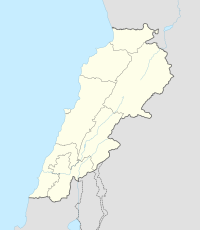Our website is made possible by displaying online advertisements to our visitors.
Please consider supporting us by disabling your ad blocker.
Afqa
Afqa
Apheca, Afeca, Afka | |
|---|---|
Village | |
 Afka From Qartaba | |
 | |
| Country | |
| Governorate | Keserwan-Jbeil |
| District | Byblos District |
| Area | |
• Total | 9.34 km2 (3.61 sq mi) |
| Elevation | 1,200 m (3,900 ft) |
 The Afqa Grotto | |
| Location | 71 kilometres (44 mi) northeast of Beirut |
|---|---|
| Region | Byblos District |
| Coordinates | 34°04′09″N 35°53′10″E / 34.069167°N 35.886111°E |
| History | |
| Cultures | Roman, Ancient Greece, Phoenicia |
| Site notes | |
| Condition | Ruins |
| Public access | Yes |
Afqa (Arabic: افقا; also spelled Afka) is a village and municipality located in the Byblos District of the Keserwan-Jbeil Governorate, 71 kilometres (44 mi) northeast of Beirut in Lebanon.[1][2] It has an average elevation of 1,200 meters above sea level and a total land area of 934 hectares.[3] Its inhabitants are predominantly Shia Muslims.[4]
Known in ancient times as Aphaca (Ancient Greek: Ἄφακα),[5] the word can be interpreted as "source",[6] is located in the mountains of Lebanon, about 20 kilometres from the ancient city of Byblos, which still stands just east of the town of Qartaba.[7] It is the site of one of the finest waterfalls in the mountains of the Middle East,[8] which feeds into the Adonis River (known today as Abraham River or Nahr Ibrahim in Arabic),[9] and forms Lake Yammoune, with which it is also associated by legend.[10]
In Greek mythology, Adonis was born and died at the foot of the falls in Afqa. The ruins of the celebrated temple of Aphrodite Aphakitis— the Aphrodite particular to this site—[11] are located there.[9] Sir Richard Francis Burton and Sir James Frazer further attribute the temple at Afqa to the honouring of Astarte or Ishtar (Ashtaroth).[12][13] Afqa is aligned centrally between Baalbek and Byblos, pointing to the summer solstice sunset over the Mediterranean. It is from Byblos that the myth was told of a mystical ark that came ashore containing the bones of Osiris. The ark became stuck in a swamp until Isis found it and carried it back to Ancient Egypt.[14]
- ^ Paul Doyle, Jr (1 March 2012). Bradt Travel Guide Lebanon. Bradt Travel Guides. pp. 148–. ISBN 978-1-84162-370-2. Retrieved 16 November 2012.
- ^ Stefan Winter (11 March 2010). The Shiites of Lebanon under Ottoman Rule, 1516-1788. Cambridge University Press. pp. 68–. ISBN 978-0-521-76584-8. Retrieved 16 November 2012.
- ^ "Afqa". Localiban. 2008-01-16. Archived from the original on 2016-03-08. Retrieved 2016-02-11.
- ^ Cammett, Melani; Issar, Sukriti (July 2010). "Bricks and Mortar Clientalism: Sectarianism and the Logics of Welfare Allocation in Lebanon". World Politics. 62 (3): 381–421. doi:10.1017/s0043887110000080. PMC 4029429. PMID 24860198.
- ^ Dictionary of Greek and Roman Geography (1854), Aphaca
- ^ Describing the recently recovered ancient name for another source, issuing from a cave, which irrigated the Palmyrene oasis, Jean Starcky remarked on the Aramaean root nefaq, "exit" and the Aramaean afqâ, "canal" (Srarcky, "Récentes découvertes à Palmyre", Syria 25.3/4 (1946/48), p 335.
- ^ "Afka Falls in Lebanon". SpeleoPhilately.com. Archived from the original on 2011-07-16. Retrieved 2007-12-03.
- ^ "Damascus and Lebanon". Travel Web Site. Archived from the original on 2011-10-02. Retrieved 2007-12-03.
- ^ a b "Tammuz". The International Standard Bible Encyclopedia. Archived from the original on 4 November 2007. Retrieved 2007-12-03.
- ^ W. F. Albright (September 1956). "El in the Ugaritic Texts". Journal of Biblical Literature. 75 (3): 255–257. doi:10.2307/3261938. JSTOR 3261938.
- ^ The localized particularity of Roman mountain sanctuaries in northern Lebanon was noted in Daniel Kercker and Willy Zschietzchmann, Römische Tempel in Syrien (Arch. institut des deutschen Reiches, Berlin/Leipzig) 1938; R.D., reviewing the work in Syria 21. 3/4 (1940) p.347 added further examples of localised Syrian divinities.
- ^ Sir Richard Francis Burton (1885). ""Terminal Essay" (In his translation of The Arabian Nights". People with a History. Archived from the original on 24 October 2007. Retrieved 2007-12-03.
- ^ Sir James George Frazer (1922). ""Adonis in Syria" in The Golden Bough". Bartleby.com. Archived from the original on 14 December 2007. Retrieved 2007-12-03.
- ^ J. G. R. Forlong (1 February 2003). Encyclopedia of Religions Or Faiths of Man 1906. Kessinger Publishing. pp. 23–. ISBN 978-0-7661-4307-4. Retrieved 14 November 2012.
Previous Page Next Page



